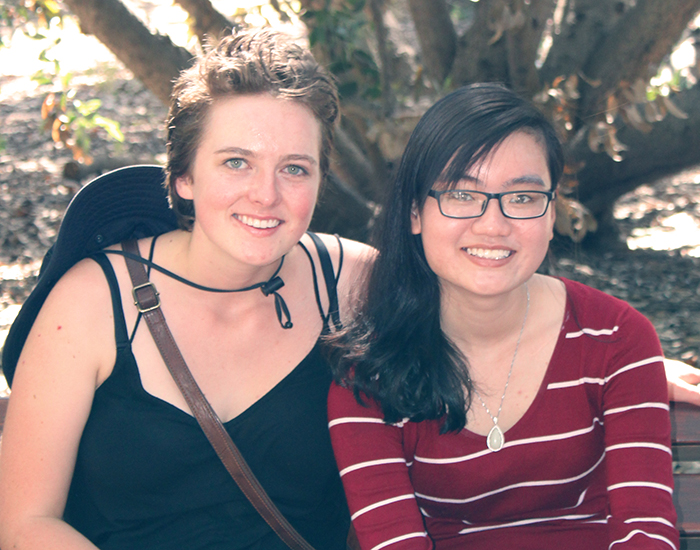Students choose the innovative Minerva Schools at KGI undergraduate program for an interdisciplinary education that expands their critical thinking, global awareness, and practical knowledge through online seminars and a residential global rotation. So Minerva undergraduates jumped at the opportunity to participate in the Summer Undergraduate Research Experience (SURE) program at Keck Graduate Institute’s Claremont campus.
Corey Orndorff and Vy Tran spent summer 2018 as members of KGI Assistant Professor Travis Schlappi’s research team designing and developing a low-cost medical device able to diagnose urinary tract infections (UTIs) in less than an hour. Orndorff, who will graduate from Minerva in 2019 with a double major in the natural and social sciences that emphasizes biology and development economics, was involved in research related to DNA amplification, a necessary step in diagnosing UTIs. Tran, now a sophomore with a major in computational sciences and a minor in natural sciences, focused on programming and data analysis.
“As an institution, our interest and role is to get people interested in science and research."
"We offer the SURE program to help accomplish this objective, and, in return, students make a valuable contribution to our research,” says Schlappi, noting that he served as a mentor to the SURE participants in his lab.
Orndorff arrived at KGI with limited research experience. She had volunteered in a lab while in India as part of her Minerva education and wondered whether research was a field that could become her career.
“I was interested in research because I see it as a way to do good in the world. Research allows you to exercise creativity while solving tangible problems and seeing results,” says Orndorff. “I knew I liked taking classes in science, but I didn’t know what it felt like to exercise those skills. I hadn’t worked on a team in a lab.”
At KGI, Orndorff learned lab procedures and protocols as well as how to generate and interpret results. She found her summer experience so rewarding that she has continued working with Schlappi remotely, making the research the topic of her senior thesis project.
“I found a space I liked enough to pursue for the next several months and now plan to look into medical school,” says Orndorff. “At Minerva, I thought of my two majors as discrete areas and hadn’t considered how they overlapped. At KGI, I was able to see the intersection of these two fields and where I’d like to be in the future: using science to better medical technology for developing countries.”
Tran also envisions becoming involved in developing new technologies that benefit society. Her origin in a developing country and belief in the power of science and technology to improve people’s lives contributed to her interest in Schlappi’s research project.
“I hoped to learn more about medical devices, the research environment, and the qualifications a scientist needs. I wanted to improve my technical as well as interpersonal skills,” she says.
Tran came away from the experience with this and more. She added to her knowledge of programming and computer simulation. She was able to apply problem-solving and critical thinking skills she was developing at Minerva in a real-world context. And she gained new insights into her capabilities.
“The most important thing I learned is that I can learn something new quickly and effectively, given a good mentor and a good project,” says Tran, who is already looking for her next summer research opportunity. “My mentor was very supportive and taught me a great deal about doing science. The other interns in our group were awesome, too. I was very fortunate to work with talented and passionate researchers.”
Schlappi was as impressed by the Minerva students as they were by their summer working with him at KGI.
“They were both very independent and took initiative to complete projects. They were excellent researchers, energetic, and passionate about science,” he says. “It was great to work with them. I hope to get more Minerva applicants, based on these two.”
